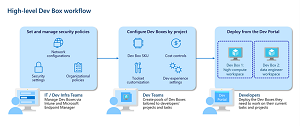News
Top 10 Azure Cloud Announcements at Microsoft Build 2023 Dev Conference
This week's Microsoft Build 2023 developer conference is all about generative AI, especially related to the company's Azure cloud computing platform.
Here's a summary of what's new -- specifically the top 10 Azure products and services that reached general availability or will soon -- at the event, which concludes tomorrow, May 25.
- Microsoft Dev Box,, a cloud-based developer workstation service that will reach GA in July, introduced new starter developer images, a specialized developer portal for spinning up dev boxes for all their projects, and the ability to customize their dev boxes using configuration-as-code files in git source control, which lets users tailor base images from IT without needing support from admins. Learn more at, "Microsoft Updates Dev Box Cloud Service for GA in July."
 [Click on image for larger view.] Dev Box Workflow (source: Microsoft).
[Click on image for larger view.] Dev Box Workflow (source: Microsoft).
- Azure Deployment Environments, which help developers use the service to self-deploy the environments they need on demand by using infrastructure-as-code templates. Templates will be available for Terraform (preview) or Azure Resource Management files. "This update now includes a specialized portal that gives developers a clear, easy interface to create and manage their environments," Microsoft said. "Developers can also use this portal to view, manage and spin up dev boxes from Microsoft Dev Box." Learn more at, "Azure Deployment Environments is now generally available."
- Azure API Management, a multicloud management solution for application programming interfaces (APIs), now has a "WebSocket API Passthrough" capability at GA. It helps organizations "manage, protect, observe and expose WebSocket APIs running in container environments with the API Management self-hosted gateway container." Also, organizations can now use Azure Active Directory tokens with the self-hosted gateway, which let customers avoid manually refreshing a gateway token that expires every 30 days.
- Azure Communications Services, which offers REST APIs for integrating voice, video and chat into applications, will get new APIs to support "intelligent calling workflows" augmented with Azure Cognitive Services' AI capabilities. This capability will reach GA next month.
- Document Translation in Language Studio, which helps developers by using AI for the batch translation of documents. "In addition, Power Automate Translator connector and Text Translator SDK for .Net, Python, Java and JS are now in preview and ACS Translator plugin for Azure OpenAI Service is in private preview."
- Azure Machine Learning Registries, which enables developers to promote, share and discover machine learning artifacts. Those include models, pipelines and environments, which can be shared across multiple workspaces in an organization to foster efficient cross-team operations and collaboration. Learn more at, "Announcing the general availability of Azure Machine Learning registries."
- Azure Container for PyTorch, which gives developers access to the latest PyTorch 2.0 capabilities and optimization software -- including DeepSpeed and ONNX Runtime -- for large model training. PyTorch is a Linux Foundation open source machine learning framework that's used for natural language and computer vision processing. Learn more at, "Enabling Deep Learning with Azure Container for PyTorch in Azure Machine Learning."
- Azure Cosmos DB "Burst Capacity," which gives databases or containers extra throughput capacity during short bursts when requests exceed throughput limits. In addition, another product reaching GA is Azure Cosmos DB's "Hierarchical Partition Keys," which helps databases be partitioned by up to three partition keys instead of just one, which broadens performance and scale options. Learn more at, "Announced at MS Build 2023: Burst capacity, materialized views, vector search, and more!"
- Fully managed service for Prometheus from Azure Monitor, which automates complex tasks such as scaling, high availability and long-term data retention. It can be used stand-alone or from within Azure Monitor or with Azure Monitor container insights and Azure Managed Grafana. Learn more at, "Introducing Azure Monitor managed service for Prometheus."
- Azure Kubernetes Service (AKS)-related capabilities, which help quicken app development, boost security, provide better cost management and offer a long-term support option. Updates here include:
- Long-term support is now GA starting with Kubernetes 1.27.
- Transactable Kubernetes apps, which "allow AKS customers to explore a vibrant ecosystem of first- and third-party Kubernetes-ready solutions from Azure Marketplace, and purchase and securely deploy them on AKS with easy click-through deployments."
- Confidential containers in AKS, now in preview, described as "a first-party offering that will allow teams to run standard unmodified containers, aligned with the Kata Confidential Containers open-source project, to achieve zero trust operator deployments with AKS."
- The multi-cluster update in Azure Kubernetes Fleet Manager (Fleet), in preview, will provide multi-cluster and at-scale scenarios for AKS clusters. "The new multi-cluster update feature gives teams the ability to orchestrate planned updates across multiple clusters for a consistent environment."
Learn more at, "Cloud-native at Build 2023."
Additional information about all of the above -- and much, much more -- can be found in Microsoft's "Book of News" for the conference.
About the Author
David Ramel is an editor and writer at Converge 360.